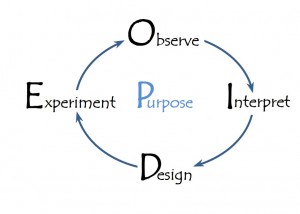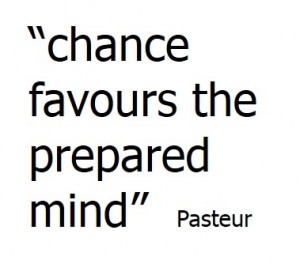 At Discerning Action we believe that Adaptive Iteration is a valuable approach to working with unpredictability and uncertainty in organisations. What do we mean by Adaptive Iteration? What are the core elements and how do they fit together?
At Discerning Action we believe that Adaptive Iteration is a valuable approach to working with unpredictability and uncertainty in organisations. What do we mean by Adaptive Iteration? What are the core elements and how do they fit together?
For the purposes of this overview I will begin with the Design step in the Adaptive Iteration cycle (although that may not always be the case in practice).
A design is a hypothesis about the most appropriate response to a complex and unpredictable problem or opportunity. The design hypothesis could relate to a physical product, a service, a plan of action, a strategy, a business model, an organisational development initiative, etc. A design is a hypothesis because until it has been successfully tested in context through one or more experiments, its suitability as a response is not proven.
Experiments can take various forms, including a thought experiment, a prototype, a simulation, a trial or a pilot. A unique natural occurrence in a business or organisational context could also be considered a form of unplanned or natural experiment. In such a case, the Adaptive Iteration cycle would start with the Experiment step.
An experiment could be predominantly confirmatory or predominantly exploratory. In the latter case, the primary objective would be to stimulate information or insights (learning) on which the next iteration of design is based. I believe the expertise to formulate and execute various types of experiments is a critical aspect of Adaptive Iteration, and is not well developed in many organisations.
 An experiment is of little value unless it is supported by accurate observation. However, the observer’s challenge is that in observation our brains are heavily influenced by what we expect to see. Our observations are significantly biased by our, often subconscious, experience and expectations. If the context for our observations is stable and predictable, this bias provides us with significant cognitive processing advantage by making it fast and efficient. But it is a major weakness if the context is complex and unpredictable. In such cases, the Observe step requires explicit consideration and the development of specific observational expertise. As Louis Pasteur once said, “in the field of observation, chance favours the prepared mind”. When observing in complex and unpredictable contexts we need to “prepare our mind”.
An experiment is of little value unless it is supported by accurate observation. However, the observer’s challenge is that in observation our brains are heavily influenced by what we expect to see. Our observations are significantly biased by our, often subconscious, experience and expectations. If the context for our observations is stable and predictable, this bias provides us with significant cognitive processing advantage by making it fast and efficient. But it is a major weakness if the context is complex and unpredictable. In such cases, the Observe step requires explicit consideration and the development of specific observational expertise. As Louis Pasteur once said, “in the field of observation, chance favours the prepared mind”. When observing in complex and unpredictable contexts we need to “prepare our mind”.
Experimental observations are useful only if they lead to relevant learning through interpretation. The learning may relate directly to the initial design hypothesis, or to unexpected observations that arose because they were made with an open mind and/or from multiple perspectives.
In complex and unpredictable contexts the types of things we seek to interpret from our observations include: critical decision points and options; weak signals that may indicate an emerging coherence; the early stages of a reinforcing feedback loop that may trigger rapid change; indicators of the underlying driving forces and motivators in the system; and the nature and impact of the constraints and boundaries of the system.
Based on the results of the experiment, the design will be further modified or refined. These changes are, in effect, another hypothesis to be tested and evaluated by further Adaptive Iteration.
At the center of Adaptive Iteration is a clear and shared understanding of overall intent or purpose. This creates coherence for the myriad of decisions that must be made when undertaking Adaptive Iteration. A shared understanding of overall Purpose is especially important given the complex and unpredictable nature of the context. The Purpose should be at a reasonably high level otherwise it will constrain the nature and scope of the design hypotheses that are generated. If it is at too low a level, it will already have significant design decisions built in and will reduce adaptive scope.





Speak Your Mind